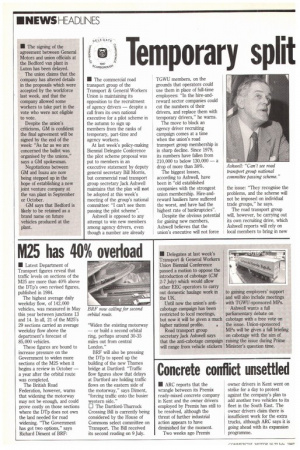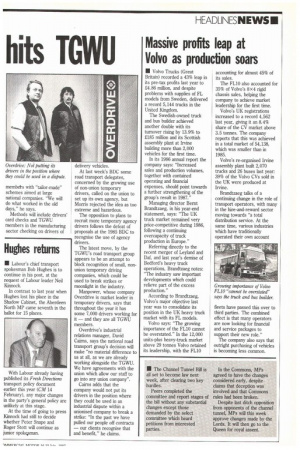Temporary split
Page 6

Page 7

If you've noticed an error in this article please click here to report it so we can fix it.
hits TGWU
• The commercial road transport group of the Transport & General Workers Union is maintaining its opposition to the recruitment of agency drivers — despite a call from its own national executive for a pilot scheme in the autumn to sign up members from the ranks of temporary, part-time and agency workers.
At last week's policy-making Biennial Delegate Conference the pilot scheme proposal was put to members in an executive statement by deputy general secretary Bill Morris, but commercial road transport group secretary Jack Ashwell maintains that the plan will not be adopted at this week's meeting of the group's national committee: "I can't see them passing the pilot scheme".
Ashwell is opposed to any attempt to win new members among agency drivers, even though a number are already TGWU members, on the grounds that operators could use them in place of full-time employees: "In the hire-andreward sector companies could cut the numbers of their drivers, and replace them with temporary drivers," he warns.
The move to block an agency driver recruiting campaign comes at a time when the union's road transport group membership is in sharp decline. Since 1979, its numbers have fallen from 210,000 to below 130,000 — a drop of more than 38%.
The biggest losses, according to Ashwell, have been in "old established companies with the strongest union membership. Hire-andreward hauliers have suffered the worst, and have had the highest rate of bankruptcies".
Despite the obvious potential for gaining new members, Ashwell believes that the union's executive will not force the issue: "They recognise the problems, and the scheme will not be imposed on individual trade groups," he says.
The road transport group will, however, be carrying out its own recruiting drive, which Ashwell reports will rely on local members to bring in new members with "tailor-made" schemes aimed at large national companies. "We will do what worked in the old days," he says.
Methods will include drivers' card checks and TGWU members in the manufacturing sector checking on drivers of At last week's BDC some road transport delegates, concerned by the growing use of non-union temporary drivers, called on the union to set up its own agency, but Morris rejected the idea as too extreme and hazardous.
The opposition to plans to recruit more temporary agency drivers follows the defeat of proposals at the 1985 BDC to recognise the use of agency drivers.
The latest move, by the TGWU's road transport group appears to be an attempt to block recognition of small, nonunion temporary driving companies, which could be used to break strikes or moonlight in the industry.
Manpower, whose company Overdrive is market leader in temporary drivers, says that throughout the year it has some 7,000 drivers working for it — and they are all TGWU members.
Overdrive's industrial relations manager, David Cairns, says the national road transport group's decision will make "no material difference to us at all, as we are already working alongside the TGWU. We have agreements with the union which allow our staff to go into any union company".
Cairns adds that the company would not put its drivers in the position where they could be used in an industrial dispute within a unionised company to break a strike: "In the past we have pulled our people off contracts — our clients recognise that and benefit," he claims.












































































